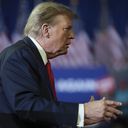How Trump’s NATO comments escalate his disdain for America’s allies

Former President Trump's recent anti-NATO comments fit into his longtime disdain for the defensive alliance, but went a step further with the suggestion he'd stand by Russia if it invaded a NATO ally.
The big picture: The comments from the GOP presidential frontrunner ignited a wave of backlash. They signal a second Trump presidency could further upend the U.S. role in NATO, fundamentally reshaping the international order.
- If Trump acted on his words, it would be a boon to Russian President Putin, who has long sought to force former Soviet states — many of whom are now NATO members — back into Moscow's fold.
- It would also jeopardize the U.S.' other military alliances and embolden other countries with expansionist desires, such as China's goal of annexing Taiwan.
What did Trump say about NATO?
During a campaign rally Saturday in South Carolina, Trump said he would not abide by the alliance's Article 5 collective defense clause if an attacked ally was not meeting defense spending obligations.
- The clause states that if a member is attacked, it will be considered an assault against all members.
Trump suggested he would "encourage" Moscow to attack "delinquent" NATO allies.
- He cited a conversation from his presidential term with an unnamed world leader:
Context: The comments also reinforce Trump's ultimate goal of withdrawing the U.S. from the post-World War II international order it helped create.
- Trump as president desired to pull the U.S. out of the World Trade Organization. He also sanctioned the International Criminal Court and withdrew the U.S. from the Human Rights Council.
- He sought to limit U.S.' presence around the world when China hopes to expand its influence in the Pacific and as Russia attempts to regain sway it lost since its invasion of Ukraine.
What are the NATO members' spending obligations?
In 2014, NATO members pledged to eventually spend a minimum of 2% of their GDP on defense spending by 2024.
- In 2023, they agreed to make the 2% requirement an enduring commitment in the alliance. But only 11 of the 31 alliance members met the requirement last year, with four more being within 0.2% of the goal.
- European leaders have made additional defense spending pledges in response to Russia's invasion of Ukraine and European defense spending has increased since the start of the invasion.
- The obligation is seen as an indicator of a country's political will to contribute to NATO's defense efforts, but it has also created tensions between countries that meet or exceed the requirement, like the U.S. and Poland, and those that don't.
- The obligation is often criticized as being an arbitrary metric that does not accurately measure a country's military capabilities or its willingness to deploy forces when needed.
How can Trump affect the U.S.' role in NATO if elected?
If elected, Trump is institutionally limited from unilaterally pulling the U.S. from NATO because of legislation passed by the Senate last year.
- The Constitution gives the Senate the power to adopt international treaties like NATO, but it doesn't clarify if the chamber needs to approve withdrawals from treaties.
- Recognizing that limitation, the Senate passed legislation that prohibits presidents from drawing the U.S. from NATO without two-thirds Senate approval or an act of Congress.
However, Trump as president could still significantly damage the treaty by attempting to remove the U.S. and sending the matter to the courts.
- He could also continue to undermine the U.S.' commitment to other NATO countries.
- He could slash U.S. contributions to NATO's collective budget, as his administration sought to do in 2019, retract U.S. troops based in Europe or prevent the admission of new members, which requires unanimous approval.
If a NATO member were attacked, Trump also isn't legally required to send armed forces or respond in a defined manner and could limit U.S. assistance or potentially withhold it entirely.
- This is because of the language of the treaty itself, which leaves the onus on members up to interpretation and discretion.
- The treaty does not require a specific response from members because it's founded on the trust that all members will collectively safeguard shared values, like individual liberty, democracy and human rights.
- But if that trust is gone, so too is the essence of the alliance.
Go deeper: Inside Trump's plans to deport millions from the U.S.